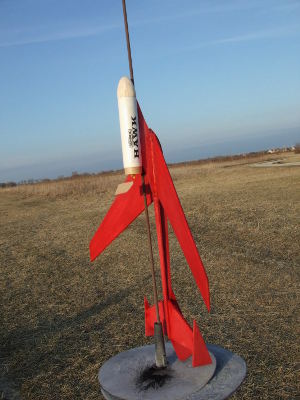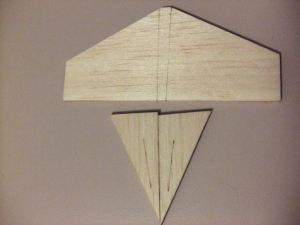| Construction Rating: | starstarstarstarstar |
| Flight Rating: | starstarstarstar_borderstar_border |
| Overall Rating: | starstarstarstarstar_border |
| Diameter: | 0.74 inches |
| Length: | 12.40 inches |
| Manufacturer: | Semroc  |
Brief:
The Hawk was originally introduced by Advanced Model Rocket Systems (AMROCS) in 1965. Its design is very much like
the Estes Falcon. It's technically a boost glider, although it doesn't use a carrier vehicle, instead relying on
ejecting the motor to handle the necessary shift in CG/CP relationship.
This Semroc "retro repro" faithfully reproduces the original design but modernizes things a bit by laser-cutting the parts.
Construction:
With a retail price of $7.50 I didn't expect a terribly complex kit, and the parts list is consistent with that
expectation--an 18mm motor tube, balsa nose cone, launch lug, a couple sheets of laser-cut balsa, and a tiny waterslide
decal. All parts were very good quality, and I'd even point out that on a few of the balsa parts, there are
laser-etched alignment lines to simplify construction.
This would probably rate about a 1.5 on the skill meter with construction consisting of 16 steps on 10 half pages of instructions loaded with helpful illustrations. I sat down to build this after dinner one winter evening, and not only finished before bedtime but I had time to write up most of the review as well. I think my total build time was barely over half an hour, and I used wood glue on many steps that could have been done with CA in half the time.
I started out by sanding the parts while still in the balsa sheet, then carefully cut them loose, and finally sanding the laser burns off the edges.
The tail section is a little unusual but easy to build. I tacked a fuselage top piece to the stabilizer using the etched lines on the stabilizer as a guide. The bottom half is notched to fit snugly over the stabilizer and sits perpendicular to the top.
The pylon that supports the raised motor pod is made from two pieces of matching balsa glued together, eliminating the need for a thicker sheet to cut. The motor pod sits on top of this pylon, and the bottom of the pylon mates up to the top/forward edge of the fuselage.
The wing dihedral is nice and simple, and I didn't even have to airfoil the wings. With the fuselage inverted (I used a sanding block that was about 1.25" thick to prop up the aft end), the wing halves are tacked to the exposed underside of the fuselage with the tips touching the table surface. While this was drying, I finished up by using CA to glue on the rudder and little mini-winglet stabilizers.
Once everything had set (I allowed the wood glue on the wings to cure overnight), I followed up with as thin and light a fillet as I could apply on all the joints.
Finishing:
A good glider generally doesn't get paint, which would just add weight and hurt performance, but flying
"nekkid" isn't that great an idea either, especially in the winter in southern Ohio when fields toggle back
and forth between frozen and slushy. I decided to treat mine with a light application of Aerogloss red dope thinned
50%.
My finished glider, untrimmed, weighed in at 8.7 grams (0.3 ounces) and had a CG 3-3/8" aft of the fuselage tip, which was actually behind the trailing edge of the wings. However, given their sweep, they are probably in line with the CP.
Construction Rating: 5 out of 5
Flight:
For the maiden flight, I wanted to just lob it up to test the glide trim, so I went with a 1/2A6-2. The winds were a
bit too stiff for such a light glider, which were blowing steady at about 8 mph. The boost was fairly straight,
leveling out a little downwind towards the end of the coast phase. The motor ejected cleanly for a perfect transition
to glide.
Recovery:
For about 4 seconds, it looked like this might actually hold up in the wind as it came out of the boost/ejection
pointed right into the wind. Once it got turned around though, it was all over--it took a nose dive at about 45 degree
angle, clearly needing a little tail weight. I had tossed it by hand a few times and thought it would do better,
however, the tosses were all on a calm day.
Flight Rating: 3 out of 5
Summary:
I'll give this the benefit of the doubt on the glide as it's clearly a trim issue on my end. Overall though, I really
like this--it's cheap, goes together very smoothly, and the boost was excellent.
Overall Rating: 4 out of 5
Other Reviews
- Semroc Hawk By Tyler Jones (March 29, 2009)
Brief: The Hawk is a boost glider that uses a rocket engine to get itself in the air. It is a "Retro-Repro" of an older rocket. Semroc is selling them for $7.50 right now so I decided to pick one up. Construction: When I bought the kit I figured there wouldn't be very many pieces. I got it and found only 5 parts in the whole kit. It comes with: 1 BT-20J ...
- Semroc Hawk By Paul Morris (March 22, 2009)
Brief: A retro boost glider that was purchased for me by my nephew and niece for my birthday. This was the first model rocket that I have built since I had a stroke--and it proved a bit of a challenge. Construction: The kit comes in a bag and contains: motor mount 2 balsa sheets of parts balsa nose cone decal launch lug The balsa was light, ...
- Semroc Hawk By Matt Gillard (March 22, 2009)
Brief: A Retro-Repro production from 1965. The Hawk is a quick to build boost glider that ejects its motor and glides back down. Flies almost from the building board. Construction: Kit comes in a plastic bag and contains: 1 instruction booklet 2 3/32" balsa part sheets 1 BT-20 motor tube 1 Balsa nose cone 1 1/8" launch lug 1 Hawk decal ...
- Semroc Hawk By Robert Gustin (March 12, 2009)
Brief: The Semroc Hawk RetroRepro boost glider is a very simple to build and easy to fly rocket boosted glider. Based on the 1965 AMROCS Hawk, it ejects its motor to establish a stable, balanced glide. Construction: In the well packaged kit you get: 1 Instruction set 2 3/32" balsa part sheets 1 BT-20 motor tube 1 Balsa nose cone 1 1/8" launch lug ...
- Semroc Hawk By Jim Bassham (March 7, 2009)
Brief: This is Semroc's Retro-Repro kit of the 1965 AMROCS Hawk. It is a swept-wing boost-glider that uses motor ejection to change CG at apogee. Construction: The kit consists of a balsa nose cone, an 18mm motor tube, a launch lug, a waterslide decal, and two sheets of laser-cut balsa parts. The instructions in this Semroc kit were well written, logical, and generously ...
- Semroc Hawk By Hans "Chris" Michielssen (February 7, 2009)
Brief: I put my order into Semroc during their end of the year Christmas discount. My order was already over $40.00 and the Hawk was a free kit! I added an extra Hawk to my order. One to build, one to hoard. I had an AMROCS catalog in the early 1970s. I remember thinking it was a near twin to the Estes Falcon. With laser cut fins, this kit went together much easier than my ...
- Semroc Hawk By Howard Smart (January 31, 2009)
Brief: Near reproduction of a boost glider (BG) kit from 1965 made by AMROCS. This is a forward motor BG which changes from boost to glide by ejecting the motor casing, shifting its CG to the rear for gliding flight. Construction: This kit contains: (2) Balsa fin sheets - laser cut Nose cone - Balsa Motor mount 18mm Launch lug Decal Construction was ...
 |
 |
Flights
Date | Flyer | Rocket | Altitude |
|---|---|---|---|
Sponsored Ads
 |
 |














